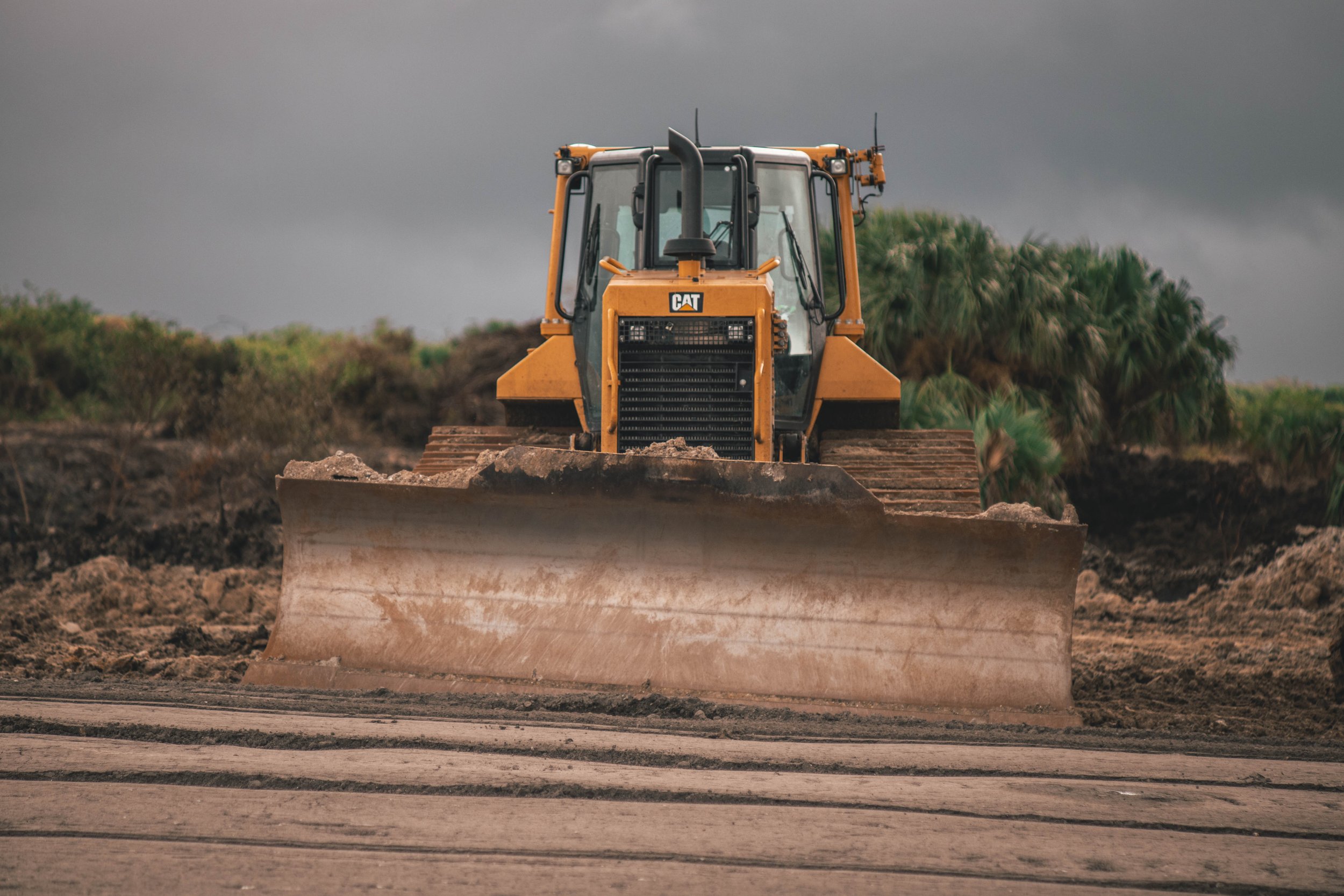WHAT IS GRADING AND WHY IS IT NECESSARY TO CONSTRUCTION?
GRADING
Grading in construction refers to the process of preparing a piece of land for construction by leveling the ground and making sure it is properly sloped to allow for proper drainage. This process is important to ensure that the land is stable and ready to support the weight of the building that will be constructed on it. Grading is typically done using heavy machinery such as bulldozers and backhoes.
Grading in construction refers to the process of preparing a site for construction by leveling and sloping the land to ensure proper drainage and provide a stable base for the building or structure. This typically involves excavating and moving large amounts of earth, as well as installing retaining walls, drainage systems, and other necessary infrastructure.The goal of grading is to create a stable and safe foundation for the building, and to minimize the risk of water damage or other issues that can arise from poor drainage. Proper grading also helps to prevent erosion and can improve the aesthetic appeal of the site.Grading is typically done by specialized contractors with the necessary equipment and expertise. This can include bulldozers, excavators, graders, and other heavy machinery. The process begins by surveying the site and creating a detailed plan that takes into account the existing topography, soil conditions, and any other factors that may affect the grading process.Once the plan is in place, the contractor will begin to move earth and other materials to level and slope the land as needed. This may involve cutting into hillsides or filling in low-lying areas to create a more even grade. In some cases, retaining walls may be built to prevent erosion or to create terraces on steep slopes.After the grading is complete, the site will be ready for the next phase of construction. This may include the installation of utilities, such as water and sewer lines, as well as the laying of the foundation for the building or structure.In summary, grading in construction is the process of preparing a site for building by leveling and sloping the land to ensure proper drainage and a stable base. It is a crucial step in the construction process that helps to prevent water damage and other issues, and is typically done by specialized contractors with the necessary equipment and expertise.Why is grading necessary in construction?
Grading in construction refers to the process of leveling the ground in preparation for the construction of a building or other structure. This is an important step in the construction process because it ensures that the foundation of the building is built on a solid, level surface. This is necessary for a number of reasons.
First, grading ensures that the foundation of the building is properly supported. If the ground is not level, the weight of the building could be unevenly distributed, which could cause the foundation to shift or settle over time. This could lead to structural damage and even the collapse of the building, which would be disastrous for the safety of the people inside.
Second, grading is important for drainage. If the ground is not properly graded, water can pool in certain areas, which can cause damage to the foundation and other parts of the building. This is especially important in areas with heavy rainfall or snowmelt, where excess water can quickly accumulate and cause problems. By properly grading the ground, water can be directed away from the building and into drainage systems, which can prevent damage and ensure the longevity of the structure.
Third, grading is also important for aesthetic reasons. A building that is not built on a level surface can appear unbalanced and unattractive. Proper grading can create a smooth, even surface that is pleasing to the eye and enhances the overall appearance of the building.
Overall, grading is an essential step in the construction process that ensures the safety, functionality, and aesthetic appeal of the finished structure. It is necessary to carefully prepare the ground and ensure that it is level and properly drained before the foundation is laid and the building is constructed. This attention to detail can help to prevent problems down the line and ensure that the building stands strong for years to come.
What are the different types of land grading?
There are several different types of land grading, each of which serves a different purpose. The type of land grading used will depend on the specific needs and goals of the project. Some projects may require a combination of different types of grading to achieve the desired results.
Some of the most common types of land grading include the following:
Sloping or sloping and benching
This type of grading involves creating a slope on the land to allow for proper drainage and prevent erosion. The slope can be either natural or artificial, and it may be combined with benching, which involves creating a series of horizontal terraces along the slope to increase its stability and improve its appearance.
Cut and fill
This type of grading involves cutting into the land to create a depression or valley, and then filling that depression with soil or other materials to create a level surface. This is often used in the construction of roads, buildings, and other structures.
Contouring
This type of grading involves creating a series of curves and undulations in the land to mimic the natural contours of the land. This can be used to create aesthetically pleasing landscapes, as well as to improve drainage and prevent erosion.
Terrace grading
This type of grading involves creating a series of horizontal terraces on the land, often using retaining walls or other structures to hold the soil in place. This can be used to create level areas for planting crops or building structures, as well as to improve drainage and prevent erosion.
Rough grading
This type of grading involves preparing the land for the construction of roads, buildings, and other structures. It typically involves removing vegetation, leveling the land, and creating a rough surface for the placement of foundation materials.
Who can perform land grading?
Land grading is the process of shaping and leveling land to prepare it for construction or other purposes. This process is typically performed by professional land grading contractors who have the necessary equipment and expertise to safely and effectively grade the land.
Land grading contractors are typically experienced in civil engineering and construction, and they have the knowledge and skills to properly assess the land and determine the best course of action for grading it. They also have the equipment necessary to perform the grading, such as bulldozers, excavators, and graders.
Before starting a land grading project, the contractor will assess the land to determine its slope, drainage, soil composition, and other factors that will affect the grading process. They will then create a plan for grading the land, taking into account any existing structures or other obstacles that need to be considered.
Once the plan is in place, the contractor will begin the grading process, using heavy equipment to remove or add soil as necessary to create the desired slope and levelness. This process may involve moving large amounts of soil and rock, and the contractor will need to take care to prevent erosion and minimize the impact on the surrounding environment.
After the land has been graded, the contractor will typically perform final inspections to ensure that it meets the specifications and requirements of the project. This may include checking for proper drainage, ensuring that the grade is correct, and verifying that the land is ready for construction or other uses.
In conclusion, land grading is typically performed by professional land grading contractors who have the necessary equipment and expertise to safely and effectively grade the land. They will assess the land, create a plan, and use heavy equipment to shape and level the land, taking care to prevent erosion and minimize the impact on the surrounding environment.
Featured Blogs
SIKES CONCRETE INC.
8030 FL-77, Southport, FL 32409
850-265-4564






